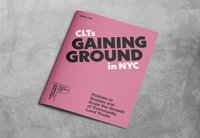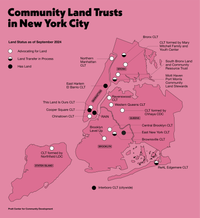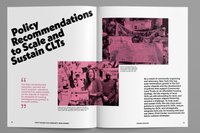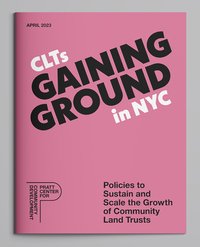
This report documents the growth of Community Land Trusts (CLTs) across New York City as a tool for collective ownership and permanent affordability of land for housing, small businesses, and community space.
As a result of community organizing and advocacy, the City has begun to implement policies supporting the model, yet most CLTs are still advocating for land and resources. CLTs Gaining Ground in NYC provides a roadmap for the City to address racialized displacement and land speculation by committing land and mission-aligned financing to CLTs at scale, as well as integrating CLTs into citywide land use, housing, and economic development plans.

BACKGROUND
Over the past fifteen years, New York City’s CLT movement has grown significantly. Amidst the city’s growing housing affordability and homelessness crises, several grassroots movements coalesced around CLTs. Tenants and unhoused New Yorkers—spearheaded by Picture the Homeless in its organizing around evictions, shelters, and the need for permanent affordable housing—began looking at CLTs to solve the underlying problem of housing speculation in the mid 2000s.
Around that time, community-based organizations and advocacy groups, including New Economy Project, explored CLTs as a strategy to prevent foreclosures and stabilize housing in Black and brown neighborhoods in the wake of the subprime mortgage crisis. Neighborhood rezonings and sales of city-owned land under Mayor Bloomberg (and later, de Blasio) further spurred interest in CLTs as grassroots groups stepped up organizing around land-use decision-making and alternative models of community control. These groups teamed up, alongside housing scholars and nonprofit mutual housing developers, to launch the New York City Community Land Initiative (NYCCLI) in 2013. Today the coalition is anchored by New Economy Project and includes dozens of CLTs and advocates from across the city leading campaigns for community controlled land and housing.
While the city continues its interest in supporting CLTs—as was the case with the Department of Housing Preservation and Development’s 2021 request for a CLT in Edgemere— the City’s approach to land acquisition and disposition still presents challenges to scaling CLTs and advancing racial and economic justice goals. These land and housing commitments were made individually as the result of community advocacy and moments of opportunity with particular housing programs or neighborhood plans–some made decades ago–and do not offer an easily replicable model. Expanding CLTs requires a long-term, citywide plan, including policies to create a pipeline of land for CLTs and strategically integrating CLTs into affordable housing plans and land use planning with a racial justice framework. This report recommends that plans must be paired with adequate public funding for low-income housing development and operations to ensure deep affordability and accessibility.

Recommendations
Enact legislation and develop plans to direct land to Community Land Trusts
Invest in CLT organizational development, housing, and agency programs
Integrate CLTs into the city’s housing, economic development, and land use plans
